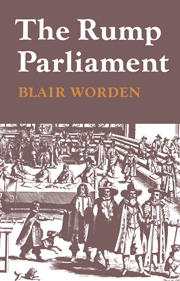Book contents
- Frontmatter
- Contents
- Dedication
- Acknowledgements
- Author's Note
- List of abbreviations
- Introduction
- PART ONE THE RUMP AND THE RUMPERS
- PART TWO THE RUMP AND REFORM
- PART THREE THE STRUGGLE FOR SURVIVAL, FEBRUARY 1649–SEPTEMBER 1651
- PART FOUR PARLIAMENT versus THE ARMY, SEPTEMBER 1651–APRIL 1653
- PART FIVE THE DISSOLUTION OF THE RUMP
- 16 The army apologias
- 17 Conclusion
- APPENDICES
- Bibliographical Guide
- Index
- Frontmatter
- Contents
- Dedication
- Acknowledgements
- Author's Note
- List of abbreviations
- Introduction
- PART ONE THE RUMP AND THE RUMPERS
- PART TWO THE RUMP AND REFORM
- PART THREE THE STRUGGLE FOR SURVIVAL, FEBRUARY 1649–SEPTEMBER 1651
- PART FOUR PARLIAMENT versus THE ARMY, SEPTEMBER 1651–APRIL 1653
- PART FIVE THE DISSOLUTION OF THE RUMP
- 16 The army apologias
- 17 Conclusion
- APPENDICES
- Bibliographical Guide
- Index
Summary
So far, in our discussion of the contents of the bill for a new representative, we have examined the case advanced by the Rump's opponents. It is not an impressive one. Two brief and vague initial accusations, issued unofficially and followed by a prolonged and extensive retreat from them, do not constitute a convincing argument. But what of the case for the defence? What did the rumpers have to say about the bill's provisions? Such of their statements as survive support the argument that the bill had provided for completely fresh elections. But the rumpers did not say very much, at least in public, and what they did say they did not say very strongly. Their behaviour on the subject of the bill, although not as puzzling as that of the Cromwellians, is nevertheless curious. Masson, in his Life of Milton, claimed that the rumpers' failure to counter effectively the charges made against them is in itself indicative of their guilt, and his argument is impressive. It must, however, be qualified.
In the first place, so little source material relating to any aspects of the Rump period has survived from the pens of the rumpers themselves that the impression of reticence may very well reflect no more than a chance gap in the evidence. It would, indeed, be quite uncharacteristic of the evidence for the Rump period as a whole if detailed accounts by rumpers of the bill's contents had survived.
- Type
- Chapter
- Information
- The Rump Parliament 1648–53 , pp. 364 - 384Publisher: Cambridge University PressPrint publication year: 1974



